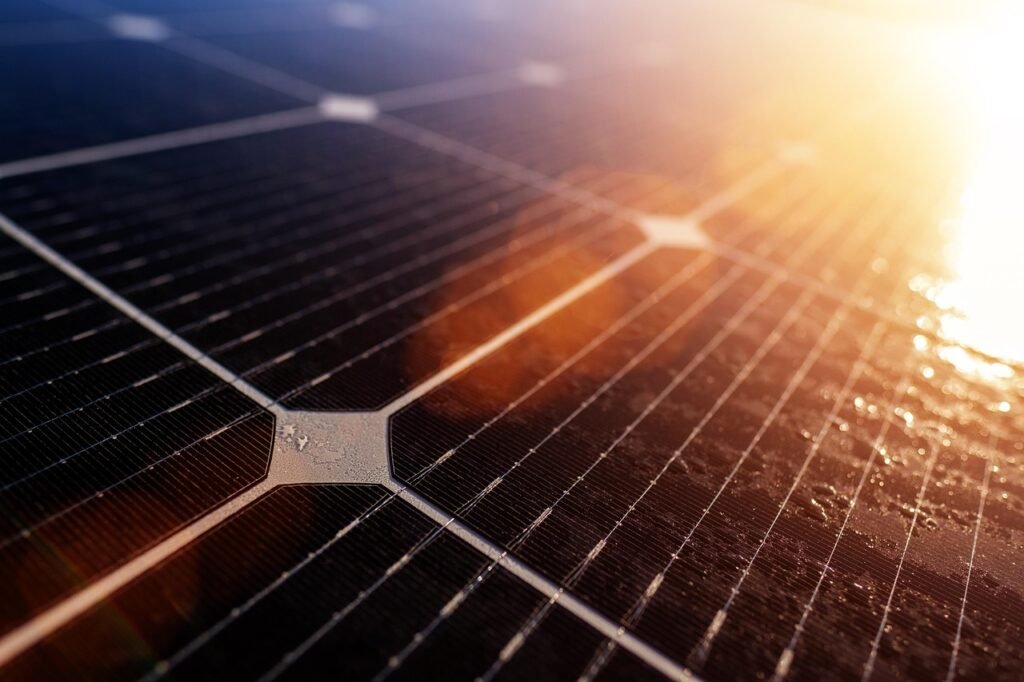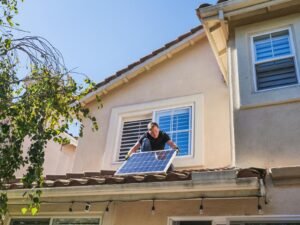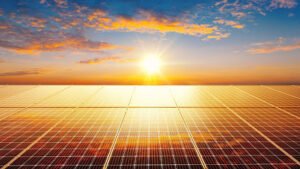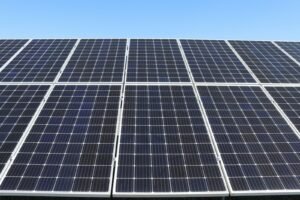Introduction to Solar Panel Maintenance
Maintaining solar panels is crucial for ensuring their optimal performance and efficiency. As renewable energy sources like solar power become increasingly important in our quest for sustainable energy solutions, understanding the factors that can impact the functionality of these systems is essential. One primary concern is the accumulation of dust, dirt, and debris on the surface of solar panels, which can significantly reduce their effectiveness in harnessing sunlight.
Over time, environmental elements such as pollen, bird droppings, leaves, and even soot can cover the photovoltaic cells. This layer of contaminants obstructs sunlight from reaching the panels, potentially leading to a drop in energy production. Studies indicate that even a small amount of dirt can diminish solar panel efficiency by up to 20%. Furthermore, prolonged neglect may lead to more serious issues, including potential damage to the panels themselves.
Regular cleaning is therefore regarded as a pivotal aspect of solar panel maintenance. By implementing a routine cleaning schedule, homeowners and businesses can ensure that their solar systems operate at peak utility, thus optimizing energy output and, by extension, financial savings on electricity bills. Additionally, clean solar panels can extend their lifespan and contribute to the overall performance of the solar energy system.
While some homeowners may opt to clean their panels themselves, considering the intricacies involved, others might prefer to engage professional services. Such professionals often have the necessary equipment and expertise to effectively clean solar panels without risking damage or placing themselves in danger. Ultimately, prioritizing solar panel maintenance through regular cleaning can make a significant difference in the energy production and longevity of these vital renewable energy systems.
Why Cleaning Solar Panels is Necessary
Regular maintenance and cleaning of solar panels are critical to ensure their optimal performance and longevity. Dust, dirt, bird droppings, and other debris can accumulate on the surface of solar panels, which can significantly reduce their energy output. When solar panels are less efficient at converting sunlight into electricity, the overall energy production can decline, which directly impacts the efficiency of a solar energy system.
Over time, this drop in efficiency can result in a decreased return on investment (ROI). Homeowners and businesses invest substantial sums into solar energy systems with the expectation of long-term savings on energy costs. However, if the panels remain dirty and neglected, the cost savings decrease. This reduction in performance can lead to a delayed payback period for the initial investment, thus softening the anticipated financial benefit.
Furthermore, neglecting regular cleaning may potentially void warranties provided by manufacturers. Many warranty agreements stipulate that solar panels must be maintained in a certain condition to remain valid. If a warranty claim arises and it is found that the panels were not adequately cared for, the manufacturer may deny coverage. This highlights the importance of understanding and complying with maintenance guidelines as laid out by the manufacturer.
In summary, maintaining clean solar panels is essential not only for maximizing energy output but also for protecting investments and ensuring warranty compliance. Regular cleaning ensures that the solar energy system operates at peak efficiency, thereby contributing to greater energy savings and a more reliable return on investment over time.
DIY vs. Professional Cleaning: A Comparative Analysis
When it comes to maintaining solar panels, the decision to clean them yourself or hire a professional service is an important one with various pros and cons. One of the primary considerations is the cost involved. DIY cleaning can be significantly cheaper since it typically only requires basic equipment such as a hose, a soft brush, and some potentially eco-friendly cleaning solutions. In contrast, hiring a professional can come with a higher price tag, often justifying this expense by offering specialized equipment and expertise that may not be available to the average homeowner.
Expertise also plays a crucial role in this analysis. Solar panels are delicate, and improper cleaning techniques can lead to damage or decreased efficiency. While many homeowners may possess the skill necessary to perform basic cleaning, professional cleaners typically have training and experience that enables them to perform the task safely and effectively. This expertise ensures that the solar panels are cleaned without causing scratches or other hidden damage that could be costly in the long run.
Safety concerns are another critical factor to consider when deciding between DIY and professional cleaning. Climbing on rooftops or using ladders to access solar panels can pose significant risks. Professionals come equipped with the necessary safety gear and have experience managing these hazards, making them more capable of handling challenging cleaning tasks. For homeowners who may lack the necessary tools or experience, hiring a professional might be the safer option.
Time investment is also a consideration in this comparative analysis. DIY cleaning can be time-consuming, especially for larger solar panel systems or those located in hard-to-reach areas. In contrast, professional services can often complete the work more quickly due to their expertise and specialized equipment, allowing homeowners to focus on other priorities. Balancing these factors can help individuals make an informed decision about the best approach to solar panel cleaning for their specific needs.
What to Consider When Hiring a Professional Cleaner
When contemplating the decision to hire a professional cleaner for your solar panels, several critical factors must be taken into account to ensure both safety and efficiency. One of the foremost considerations is the cleaner’s credentials. It is essential to verify that the service provider is licensed and insured. This ensures that they not only possess the necessary training but also have the requisite coverage in the event of accidents or damage during the cleaning process.
Experience is another pivotal aspect. A cleaner with a proven track record in solar panel maintenance is likely to be more skilled at handling various cleaning challenges. Inquire about how long the company has been in operation and whether their staff has received specific training related to solar panel cleaning. A well-established company may have refined its techniques and approaches over time, providing you with assurance in their services.
The equipment utilized by the cleaning service is equally important. High-quality, specialized cleaning tools play a crucial role in the cleaning process. A professional cleaner should utilize equipment that is designed explicitly for solar panels, as the wrong tools could lead to scratches or damage. Furthermore, it can be beneficial to ask about the cleaning solutions they use. Eco-friendly products are preferable, as they ensure that no harmful chemicals are left on the panels, which could hinder efficiency post-cleaning.
Understanding the cleaning methods adopted by the service is also necessary. Some companies may use high-pressure wash techniques, while others may prefer softer methods that minimize the risk of damage. Always inquire about the processes used and assess whether they align with the best practices recommended by solar panel manufacturers. Finally, taking the time to read customer reviews can provide invaluable insight into the reputation and reliability of the cleaning service, highlighting both strengths and potential weaknesses that could influence your decision.
Cost of Hiring a Professional Solar Panel Cleaner
When considering solar panel cleaning, one of the pivotal factors facing homeowners is the cost associated with hiring a professional cleaner. The expense can vary widely based on several key elements. Primarily, the size of the solar panel installation plays a significant role. Larger systems, whether they are residential or commercial setups, typically require more time and effort to clean, resulting in higher labor costs. Additionally, the complexity of the installation can influence pricing, as panels positioned at difficult angles or hard-to-reach locations may necessitate special equipment or extra care.
Another essential aspect to consider is the local market rates for solar panel cleaning services. Geographic location can affect the prices due to competition levels and the cost of living in the area. In urban centers with numerous service providers, homeowners may find competitive pricing, while those in more rural areas might face limited options and higher rates. On average, homeowners can expect to pay anywhere from $100 to $300 for a professional cleaning service, with service providers often charging per panel or offering flat-rate packages for entire installations.
Furthermore, it’s worth noting that some companies may offer bundled services, which can include routine maintenance checks along with cleaning. Opting for these combined packages might be cost-effective in the long run, enabling homeowners to maintain optimal performance from their solar panels while saving on overall service fees. In summary, when budgeting for solar panel cleaning, evaluating the size of the installation, local market dynamics, and available service bundles can aid homeowners in making informed decisions that best fit their financial parameters.
Recommended Cleaning Frequency for Solar Panels
The cleaning frequency of solar panels is a crucial aspect of maintaining their efficiency and longevity. Generally, solar panels should be cleaned at least twice a year; however, this schedule can vary significantly based on several factors including the local climate, geographic location, and environmental conditions. For instance, regions with frequent rain may require less frequent cleaning, as rainwater can naturally wash away dirt and debris. Conversely, locations with minimal rainfall or prolonged dry seasons will likely necessitate more regular interventions.
Another important consideration is the proximity of the solar panels to pollutants. For example, if solar panels are situated near industrial areas, highways, or agricultural fields, they may accumulate dust and grime more quickly than those in cleaner environments. Machinery emissions, particulate matter, or even bird droppings can significantly reduce a solar panel’s ability to capture sunlight. Consequently, in such areas, an increase in cleaning frequency may be warranted, possibly to quarterly or even monthly cleanings depending on the severity of the pollution.
Seasonal variations also play a pivotal role in determining cleaning needs. Winter months may see less accumulation due to snow covering the panels, but a warm spring or summer may encourage pollen and dust buildup. Therefore, homeowners and businesses must assess their unique context to devise an appropriate maintenance schedule. Regular inspections help identify whether cleaning is necessary; visual cues such as streaks or a dull surface are indicators that a cleaning may be needed. Ultimately, tailoring the cleaning frequency to the specific conditions surrounding the solar panels will ensure optimal performance and energy production.
Safety Precautions in Solar Panel Cleaning
When it comes to solar panel cleaning, safety is of utmost importance. Whether one opts for a DIY approach or chooses to hire professional services, implementing proper safety measures is critical to avoid accidents, injuries, or potential damage to the panels themselves. First and foremost, individuals should assess the condition of the solar panels and surrounding areas before beginning any cleaning process. Ensuring that the panels are not obstructed by debris or hazards is a vital preliminary step.
For those considering a DIY cleaning method, wearing appropriate safety gear such as gloves, goggles, and non-slip shoes is essential. This gear protects against possible injuries from sharp edges, slips, and falls. Additionally, if cleaning solar panels located on a roof, the use of a sturdy ladder is crucial. Ensure that the ladder is placed on a flat surface and is stable before climbing. It is also advisable to have someone else present while cleaning, to assist if any issues arise.
In instances where the solar panels are mounted at an elevated position, employing safety harnesses and other fall protection methods is recommended. Working at heights can be perilous, and having safety equipment in place minimizes the risk of accidents. Furthermore, utilizing gentle cleaning solutions and soft cloths is imperative to prevent scratching or damaging the panels. Harsh chemicals should be avoided, as they can lead to degradation of the panel’s materials.
For individuals opting for professional cleaning services, it is crucial to ensure that the company adheres to safety protocols and uses specialized equipment designed for solar panel maintenance. Professionals are typically equipped with the right tools and training necessary to execute the job safely and efficiently. By prioritizing safety both for DIY projects and professional engagements, the risk of accidents or damage to solar panels can be significantly reduced, ensuring optimal performance and longevity of the solar energy system.
Environmental Benefits of Clean Solar Panels
Maintaining clean solar panels plays a pivotal role in enhancing their efficiency and effectiveness in harnessing solar energy. When solar panels are free from dust, dirt, and debris, they can capture sunlight more effectively, leading to an increase in energy output. This means that homeowners and businesses can generate more energy from their solar systems, thereby maximizing their return on investment and leading to greater energy savings. As a result, the relationship between clean solar panels and energy production is crucial in promoting sustainable energy practices.
Moreover, clean solar panels reduce the need for additional energy sources, whether fossil fuels or other non-renewable energy forms. When solar panels operate at optimal efficiency due to regular cleaning, they contribute to lowering greenhouse gas emissions and other harmful pollutants. This directly supports global sustainability goals by promoting a shift towards renewable energy sources, which are integral to combating climate change. Therefore, when solar panels are maintained in good condition, they play a significant role in reducing an individual’s or a business’s carbon footprint.
Additionally, investing in the cleanliness of solar panels can foster a culture of environmental consciousness and responsibility. It encourages users to remain proactive in maintaining their solar energy systems and highlights the importance of proper upkeep in the broader context of eco-friendliness. As more individuals adopt solar technology, the cumulative effect of clean solar panels could lead to substantial environmental benefits, showcasing how small efforts can contribute to larger sustainable initiatives. This ultimately yields a healthier planet while reinforcing the advantages of renewable energy solutions.
Conclusion: Making the Right Choice for Solar Panel Cleaning
In assessing whether to hire a professional cleaner or undertake the task of cleaning solar panels yourself, several vital factors come into consideration. Firstly, it is essential to recognize the importance of maintaining solar panels for optimal efficiency. Accumulated dirt, debris, and other contaminants can significantly diminish the performance of solar energy systems. Therefore, regular cleaning is crucial to ensure the panels operate effectively and maintain energy production levels.
When evaluating the DIY approach, it is important to weigh the potential benefits against the challenges involved. Performing solar panel cleaning yourself can be cost-effective, allowing homeowners to save money on professional services. However, this option also presents risks, including safety concerns, especially if the panels are situated on rooftops. Furthermore, improper cleaning techniques or the use of inappropriate materials can lead to damage of the solar panels, resulting in more significant costs over time.
On the other hand, hiring a professional cleaning service offers expertise and efficiency. Professionals come equipped with the right tools, knowledge, and techniques to ensure a thorough cleaning while minimizing the risk of damage. Additionally, they can identify potential issues during the cleaning process that may need attention, aiding in the overall maintenance of the solar energy system. While this option incurs a cost, the long-term benefits of maximizing panel performance may outweigh the expense.
Ultimately, the decision should be guided by individual preferences, budget considerations, and safety factors. By thoroughly assessing these elements, homeowners can make an informed decision regarding solar panel cleaning, whether opting for professional assistance or choosing a DIY approach to maintain their solar investment effectively.




